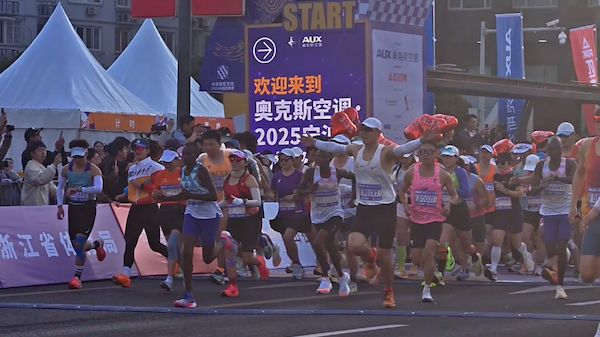Nation's antitrust efforts boost fairness, stability
Paradigm shift seen in authorities' approach in 2021, aiming to ensure competitive and innovative platform economy
The year 2021 has been called a remarkable year for China's antitrust efforts. The country enacted stricter regulations on the platform economy, imposed fines on a string of tech companies for improper behavior, set up an antimonopoly bureau and proposed amendments to its Antimonopoly Law.
Behind such efforts is a paradigm shift, in which Chinese authorities no longer hold a tolerant, laissez-faire attitude toward the booming platform economy, in which electronic platforms have come to play a large role in the exchange of goods and services.
Its growth, industry experts said, was leaning toward the haphazard, in a way that threatened to create monopolies and destabilize the economy.
The experts said they expect that antitrust efforts will continue in 2022 with acceleration in antimonopoly supervision and law enforcement. Authorities, meanwhile, are expected to continue to set up limits for companies to prevent a disorderly expansion of capital in the market.
"There is no doubt that antitrust efforts will be intensified in 2022, but stabilization will be a key word for those efforts," said Zhong Gang, executive director of the Competition Law Research Institute at East China University of Political Science and Law in Shanghai.
"The country will first strive to recover stable order in areas that have some monopolistic behavior. The ultimate goal of antitrust efforts is to offer a stable market environment and fair market order for all market entities to develop and grow vigorously.
"More efforts are likely to be made in antitrust law enforcement in industries that affect people's livelihoods, such as medical and healthcare, so as to protect the interests of consumers," Zhong said.
Keeping the enforcement of laws even and unified across the nation will also become a focus in 2022, given that it is necessary to prevent authorities in different regions from abusing administrative power, he added.
The annual Central Economic Work Conference, held in December, sent a clear signal that China will increase its efforts to help companies develop in a stable and orderly way, industry experts said. The government will set up warning beacons to fully engage the positive role of capital while reining in its negative effects, they said.
Gan Lin, the recently appointed head of the new antimonopoly bureau under the State Administration for Market Regulation-or the SAMR-said the country will step up antimonopoly supervision and law enforcement, and will continue to regulate improper competition in key areas, including the platform economy, technological innovation and information security.
"More efforts will be made to speed up the improvement of regulatory systems regarding market access, review of fair competition and supervision of fair digital economy competition," said Gan, who is also deputy head of the administration.
In November, the antimonopoly bureau was set up in the same building as the SAMR in Beijing. The move came after China's October proposal to make the first batch of major changes to the Antimonopoly Law since it was enacted in 2008.
"Such major steps reflected the strengthening of the nation's in-house abilities in greater enforcement and autonomy of antitrust matters, in order to catch up with strengthening domestic antitrust efforts," said Liu Xu, a research fellow at the National Strategy Institute at Tsinghua University.
"China is also looking to global practices like those of antitrust authorities in the United States and Europe. Both economies have many more antitrust enforcement personnel than China," said Liu. The antitrust workforce needed to be beefed up after the government integrated three separate antitrust enforcement departments into the SAMR in 2018, which led to the availability of fewer full-time, permanent workers, Liu said.
There is also an urgent need to further improve antimonopoly and industry regulation, according to Gan from the SAMR, because new industries and business models are quickly emerging, and the way they compete differs markedly from what is standard in the traditional economy.
"The bureau will also continue to strengthen review of cases related to the concentration of control by operators to prevent disorderly expansion of capital," she added. Such a concentration of economic power allows them to obtain control over others, which may lead to monopolies.
The administration said that since 2020, it has imposed penalties totaling 60 million yuan ($9.41 million) in 88 cases related to the concentration of control by operators. From January to October 2021, the number of cases closed in that area increased by 50.4 percent year-on-year. The average time for filing and closing such cases was shortened by more than one-third.
A string of Chinese internet heavyweights-including Alibaba Group Holding, Tencent Holdings, Meituan, JD and Suning.com-were fined in 2021.
In April, the market watchdog imposed a record fine of 18.23 billion yuan on e-commerce giant Alibaba for monopolistic behavior. The fine was equivalent to 4 percent of Alibaba's domestic sales in 2019.
In October, the SAMR imposed a fine of 3.44 billion yuan on food delivery giant Meituan for abusing its dominant market position to compel merchants to sign exclusive agreements with its platform.
That amount was equal to 3 percent of Meituan's domestic revenue in 2020. The company will also have to return 1.29 billion yuan in deposits paid by merchants to partner exclusively with its platform.
"One of the main goals of antitrust efforts over the past year is to offer timely responses to monopoly cases that are related to platform-based companies and the overall sector," said Sun Jin, director of the Competition Law and Policy Research Center at Wuhan University.
"Recent antimonopoly cases are focused on platform-based companies because a group of internet platforms developed into giants in the digital era and have extensive market influence, which resulted in new monopolistic behavior that ultimately hurt consumer interests and smaller businesses," Sun said.
The number of digital platforms with valuations of over $1 billion hit 197 in China as of the end of 2020, up by 23 year-on-year, according to the China Academy of Information and Communications Technology. The number of platform-based companies in China and the US with a valuation of more than $10 billion each accounted for 84.2 percent of the global total.
"But China's antitrust efforts do not aim to crack down on a single company or industry," said Wang Xianlin, director of the Center for Competition Law and Policy at Shanghai Jiao Tong University.
"Recent antimonopoly measures are aimed at restoring fair competition in the market and creating a better business environment for all market entities, especially small and medium-sized enterprises," Wang said.
The only way to promote the development of new technologies, new industries, new formats and new models of digital economy is by creating a market environment favorable for fair competition, said Ouyang Rihui, assistant dean of the China Center for Internet Economy Research at the Central University of Finance and Economics.
"The aim of strengthened antitrust regulations is to ensure that China's digital economy remains competitive and innovative," he said.
According to these two experts, platform-based technology and internet companies are expected to rely not only on the size of China's population for the growth of their business, but also on continuous efforts in new development, including boosting research and development capabilities.
Xu Lei, president of JD, said that the regulatory measures are conducive to the company's long-term business growth and will help to create a fair and orderly business environment and promote long-term and sustainable development of these industries.
"The Chinese authorities are working to bring platform enterprises into a certain regulatory framework, which can effectively rectify and regulate misconduct such as disorderly expansion of capital and monopolistic behavior," Xu said.
Wang Tian, chairman of retail and real estate company Better Life Group, said:"China recently beefed up its antitrust efforts and regulations on all kinds of unfair competition. Such efforts give law-abiding enterprises broad development space and also drive the efficiency of private companies and the market economy."
Timeline
· 2018: The State Administration for Market Regulation was established to unify China's antimonopoly functions, which had been scattered across three ministries-the State Administration for Industry and Commerce, the Ministry of Commerce and the National Development and Reform Commission.
· April 2021: The State Administration for Market Regulation imposed a record fine of 18.23 billion yuan ($2.86 billion) on e-commerce giant Alibaba Group for monopolistic behavior.
· October: China proposed major changes to its Antimonopoly Law.
· November: China's antimonopoly bureau was officially set up.

 Voices from starting line
Voices from starting line
 China welcomes global travelers with open arms
China welcomes global travelers with open arms
 Kharitonova's running story in Ningbo
Kharitonova's running story in Ningbo



